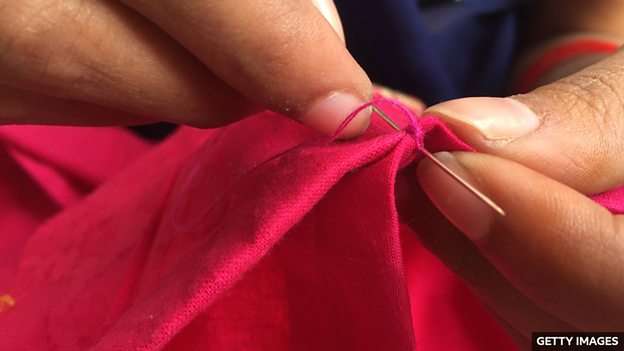内容简介
“Prepositional phrase(介词短语)” 是一类由介词引导的短语,它们往往能通过简短的结构表达出丰富而具体的含义。比如,三个包含 “hand” 的介词短语 “with hand”、“by hand” 和 “in hand” 虽然都与 “手” 有关,但却表达出了 “用手”、“亲手” 或 “掌控” 等等不同的含义。听节目,跟主持人 Phil 和步理一起学习这三个介词短语的用法。
文字稿
(关于台词的备注: 请注意这不是广播节目的逐字稿件。本文稿可能没有体现录制、编辑过程中对节目做出的改变。)
Buli
大家好,欢迎收听 BBC 英语教学的 “你问我答” 节目。I'm Buli.
Phil
And I'm Phil. We have a question from one of our listeners.
Question
你好,请问一下 “by hand”、“in hand” 和 “with hand” 之间的区别。
Phil
So, we're looking at different things we can say with the word 'hand'.
Buli
本期问题中提到了三个包含 “hand(手)” 这个单词的介词短语。不过,首先我们需要注意的是,和 “by hand” 和 “in hand” 相比,“with hand(用手……)” 并不是一个固定搭配。其中,“with” 用于引出做某事使用的工具,意思是 “用……”。比如 “with head(用头)” 或 “with a pen(用一支笔)” 等等。
Phil
Note that we don't usually use the preposition 'with' and 'hand' together without a determiner of some kind. Listen to these examples.
Examples
I play tennis with my left hand.
(我打网球时用左手握拍。)
I got all the stones out of the water with my hand.
(我用手把所有石头都从水里捞了出来。)
Buli
我们可以在例句中注意到,“with hand” 这个结构通常需要搭配限定词来指出 “with whose hand(用谁的手)” 或者 “with which hand(用哪只手)” 等等。
Phil
'By hand' and 'in hand' are set expressions, we use them as adverbial phrases.
Buli
是的。“By hand” 和 “in hand” 都是结构固定的介词短语。其中,“by hand” 是一个副词性介词短语。“Do something by hand” 的意思就是 “用手做某事”,并且暗示 “这个动作通常使用机器或工具等完成”。如果一件事原本就需要用手或手工完成,比如一项体育运动,那么就不能使用 “by hand” 来修饰。来听一组例句。
Examples
My sewing machine broke, so I sewed the dress together by hand.
(我的缝纫机坏了,所以我自己动手把这条裙子缝好了。)
Using a food mixer to make dough is much quicker than doing it by hand.
(用食物搅拌器揉面比用手揉面快多了。)
Phil
There is a different way to use 'by hand' – if you deliver something by hand, it means you do it personally rather than using a mail service. Listen to these examples.
Examples
It's always best to deliver a Valentine's card by hand. It adds a personal touch.
(情人节贺卡最好亲自送给对方,这样显得更私人。)
That parcel will cost a lot to send, and they don't live far away. Why don't you deliver it by hand?
(寄那个包裹要花不少钱,而且他们也住得不远。要不你自己把它送过去吧?)
Buli
在上面的例句中,我们也可以看到 “deliver something by hand” 还可以表示 “亲手或亲自递送某物”。接下来,我们再来看看 “in hand” 具有哪些含义。
Phil
'In hand' also has different meanings – the first meaning is 'available to you', and we often use it when we have extra of a resource that we can use if we need it.
Buli
“In hand” 是一个形容词性介词短语,它可以用于形容某物是 “目前所拥有的,可支配的”。“In hand” 既可以用来形容一件物品,也可以形容做某事所需的材料、条件甚至时间等等。它通常搭配动词 “have(有)”、“keep(保持,保有)” 等等。来听一组例句。
Examples
We've planned for the project to take five days. Let's keep two days in hand in case it turns out to be more complicated than I thought.
(我们计划用五天时间完成这个项目。不过咱们再额外留出两天时间吧,以防这个项目比我想象的更复杂。)
The team is in second place, but they've got a game in hand so they could make up the points.
(这支队现在处在第二名的位置,不过他们还有一场比赛,所以有能追赶比分可能。)
Phil
Another meaning of 'in hand' means 'what we need to deal with now'. We often use it with tasks, issues and problems.
Examples
That's interesting, but let's focus on the task in hand – we can't go home until we've solved it.
(这件事很有趣,但咱们还是关注手头的工作吧。因为在解决这个工作问题之前我们不能回家。)
The matter in hand today is deciding the best way to redesign the office canteen.
(今天手头的议题是决定重新设计办公室餐厅的的最佳方案。)
Buli
上面两个例句为我们展示了 “in hand” 的第二个用法,意思是 “当下的,正在进行的”。除此之外,如果我们说 “I have something in hand”,意思就是 “某事尽在我的掌握之中,我掌控着某事”。来听一组例句。
Examples
There are a lot of guests arriving, but don't worry, I've got it all in hand.
(明天会有许多客人抵达。不过别担心,一切我都安排好了。)
I hope you've got everything in hand because we don't want any surprises.
(我希望一切都在你的掌握之中,因为我们不想看到任何意外的发生。)
Phil
So, if you do something with your hand, you just use your hand. If you say that you are doing something by hand, usually you're telling people that you're not using a machine. Things that are in hand need attention, or are available for you to use, or are under control.
Buli
没错。“Do something with your hand” 的意思是 “用手做某事”,它和 “do something by hand” 的区别在于后者强调 “用手或手工做通常使用机器或工具完成的事”。“Deliver something by hand” 还可以用来表达 “亲手或亲自递送某物”。而 “in hand” 则可以表达三个不同的含义:“目前所拥有的,可支配的”、“当下的,正在进行的” 或 “被掌控,在掌控之中”。
Phil
Remember, if you have a question that you'd like us to answer, you can email us too at questions.chinaelt@bbc.co.uk
Buli
你也可以通过微博向我们提问,我们的微博账号是 “BBC英语教学”。Bye!
Phil
Bye.

